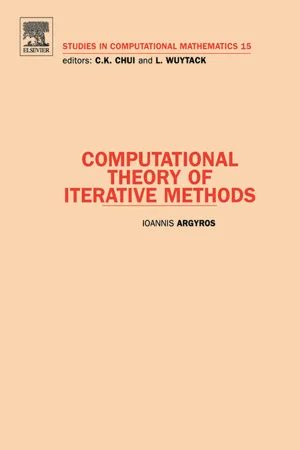
- 504 pages
- English
- ePUB (mobile friendly)
- Available on iOS & Android
Computational Theory of Iterative Methods
About this book
The book is designed for researchers, students and practitioners interested in using fast and efficient iterative methods to approximate solutions of nonlinear equations. The following four major problems are addressed. Problem 1: Show that the iterates are well defined. Problem 2: concerns the convergence of the sequences generated by a process and the question of whether the limit points are, in fact solutions of the equation. Problem 3: concerns the economy of the entire operations. Problem 4: concerns with how to best choose a method, algorithm or software program to solve a specific type of problem and its description of when a given algorithm succeeds or fails. The book contains applications in several areas of applied sciences including mathematical programming and mathematical economics. There is also a huge number of exercises complementing the theory.- Latest convergence results for the iterative methods - Iterative methods with the least computational cost- Iterative methods with the weakest convergence conditions- Open problems on iterative methods
Tools to learn more effectively

Saving Books

Keyword Search

Annotating Text

Listen to it instead
Information
Table of contents
- Cover image
- Title page
- Table of Contents
- Studies in Computational Mathematics 15
- Copyright page
- Dedication
- Introduction
- Chapter 1: Linear Spaces
- Chapter 2: Monotone convergence
- Chapter 3: Contractive Fixed Point Theory
- Chapter 4: Solving Smooth Equations
- Chapter 5: Newton-like methods
- Chapter 6: More Results on Newton’s Method
- Chapter 7: Equations with Nonsmooth Operators
- Chapter 8: Applications of the weaker version of the Newton-Kantorovich theorem
- Chapter 9: The Newton-Kantorovich Theorem and Mathematical Programming
- Chapter 10: Generalized equations
- Chapter 11: Monotone convergence of point to set-mapping
- Chapter 12: Fixed points of point-to-set mappings
- Chapter 13: Special topics
- Bibliography
- Appendix A: Glossary of Symbols
- Index
Frequently asked questions
- Essential is ideal for learners and professionals who enjoy exploring a wide range of subjects. Access the Essential Library with 800,000+ trusted titles and best-sellers across business, personal growth, and the humanities. Includes unlimited reading time and Standard Read Aloud voice.
- Complete: Perfect for advanced learners and researchers needing full, unrestricted access. Unlock 1.4M+ books across hundreds of subjects, including academic and specialized titles. The Complete Plan also includes advanced features like Premium Read Aloud and Research Assistant.
Please note we cannot support devices running on iOS 13 and Android 7 or earlier. Learn more about using the app